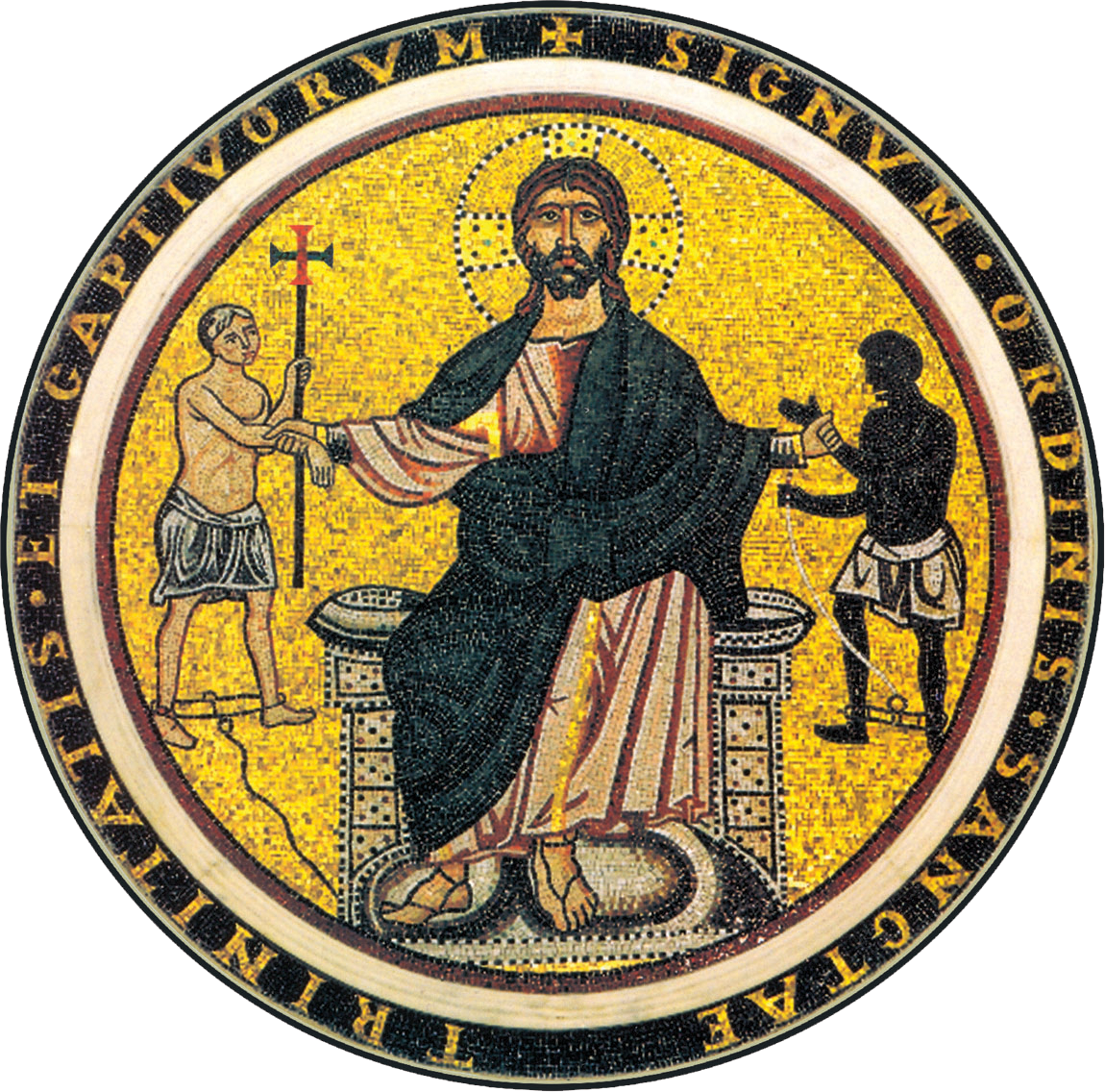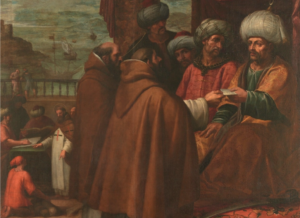MESSAGE OF THE MINISTER GENERAL TO THE TRINITARIAN FAMILY ON THE OCCASION OF THE
SOLEMNITY OF SAINT JOHN DE MATHA AND NATIVITY OF OUR LORD
Lit. Circ. 9/2022
B.S.SS.T
Dear Brothers and Sisters,
My cordial and fraternal greetings to all the members of the Trinitarian Family.
We are preparing to celebrate both the solemnity of our Founder and Christmas during a time of great uncertainty and concern. The last few years we have lived with the pandemic, which has still not been definitively overcome, and now we are faced with a new emergency related to the Ukraine war, which exposes all humanity to considerable risks.
Last October, during my pastoral visit to Poland, I met refugees from Ukraine who were guests of our community in Krakow. I listened to their painful stories. It impossible not to read in their eyes and see sad look the terror from the war. They are women with their young children and teenagers, living traumatized lives. One of them reported that her son, immediately after fleeing, had been mute for more than two weeks. Another described that she and her children often had panic attacks when they heard the sound of a plane flying overhead. The war was completely unexpected. It disrupted and turned their lives upside down. Until the day before the war, and they were living a peaceful life between family and work, they could not imagine that in the 21st century war could break out in their home.
Now they live in uncertainty and fear for their husbands and adult sons who remained in their homeland to fight an absurd war. The welcome they have found in our home is spiritual medicine, which brings relief, hope, and new life.
Thanks to the extraordinary sensitivity shown by the entire Trinitarian Family, we are continuing to support the great work of welcoming refugees, which has required extra generosity and dedication from our Polish religious. The aid sent to Poland is also shared with other religious institutions and with Caritas in Krakow. Through a Ukrainian family, which has been living in Poland for several years, we have also sent basic necessities to some villages in Ukraine on the border with Russia: this is the only aid those villages have received since the beginning of the war.
We cannot forget all the other conflicts that form what Pope Francis has called “the third world war fought in pieces.” Humanity is besieged by more than 50 conflicts in so many parts of the world. Most of these conflicts are unknown or at best perceived as distant, invisible, and nonexistent. Those who pay the highest price are always the poor and the vulnerable. War and poverty feed and reinforce each other. The terrible consequences of war, like a tsunami, spread throughout the world, making it more fragile. To the contagious epidemic of violence and war we must respond daily with a patient and peace-building effort.
Peace needs workers and artisans to guard and promote it throughout the world. Peace is not so much a word to be shouted as an attitude to be cultivated through daily acts of listening and understanding. All of us in our families and communities are called to be peacemakers by cultivating sincere dialogue, and welcoming others with their differences. May our hearts and fraternal relationships be wombs of peace and hope for all who suffer. Peace is the essence of our charism and the style of our mission. And peace is built starting from the least among us. Where there is suffering, we cannot fail to show solidarity. Where human rights are trampled, let us not lack our concrete commitment. Where there is loneliness and abandonment, let us not fail to express kindness.
As the Venerable Giorgio La Pira, mayor of Florence, said, “If there is someone who suffers, I have a precise duty: to intervene in every way with all the expedients that love suggests and that the law provides, so that suffering may be diminished or alleviated.” Every gesture of charity is a piece that makes up the mosaic of peace. Let us entrust in prayer to the Most Holy Trinity our every intention and gesture of peace.
***
In a few months the Trinitarian Family will meet to celebrate the VII Intertrinitarian Assembly. The history of these assemblies tells us all the good they have done to our religious family. They have helped us to mature our charismatic identity with a greater awareness to preserve it from the temptations of closure and self-centeredness. At the same time, they have prompted us to live in a concrete way with profound renewal called forth by the Second Vatican Council.
Every family assembly and meeting are a great gift from God to grow in communion with one another and in fidelity to the charism. It is a unique opportunity to express the synodal dimension deeply rooted in the redemptive and merciful charism of St. John de Matha.
The next assembly will be celebrated in Spain. The assembly has been organized in a new and creative way, choosing a novel form: a pilgrimage in the footsteps of the first redemptive missions of the Trinitarian religious. The slogan that summarizes this assembly is “The footprint of the Redeemers: Vocation and Identity.” Each word that makes up this slogan has a profound meaning.
I dwell on the first: “footprint,” that is, the mark one leaves of one’s presence and action. It is not a passing mark, which is easily erased, but a lasting and indelible mark. The footprint refers to the singular identity of the one who generates it. The clearer our identity the stronger the footprint we leave in the lives of others. The footprint also refers to our mission, particularly to the strength of our Gospel witness. We are called to leave an imprint of the gospel and humanity in the lives of the people we meet. The chosen modality is also particularly significant: the pilgrimage, which includes several stages from Spain to Morocco and will be marked by moments of formation, meetings, and testimonies.
Pilgrimage is a powerful symbol of our human condition but also of our faith in God. The detachment from the daily routine, the risk and fatigue of the journey, the sharing, the prayer, are some elements that make this experience unique. Above all, pilgrimage is an experience of communion. This experience brings out the need for the other. The false idea of self-sufficiency falls away and the truth that others are necessary to us is imposed. One rediscovers, in fact, that deep bond that unites us and shows us eloquently that we cannot live without others or against others. Pilgrimage is also a great symbol of the mystery of the Church: we are a people on a journey, recognizing that we are united in our common origin and by the same goal to be reached. Pilgrimage is also a powerful symbol of our charism. Trinitarians are presented in the primitive Rule as itinerant friars, pilgrims of peace and charity on the roads of the world. Retracing the route of the first redemption missions also reveals the need to remain faithful to the charism of the origins and at the same time to rediscover its “flagrant necessity.” This sentiment is increasingly reiterated by the bishops of the local Churches where our communities operate and whom I meet during my pastoral visits. Fidelity is the criterion and soul of authentic renewal. Without fidelity there is no true renewal, just as without openness to the new there is no true fidelity. This need for fidelity involves every area of our lives. Fidelity in formation, both initial and ongoing, means deepening the specificity and originality of the Trinitarian charism. Fidelity in our spiritual life means drawing from the source of personal and communal encounters with God-Trinity.
Fidelity in mission means giving every apostolate our charismatic expression, which puts love for the poor and suffering, defense of the oppressed and support for persecuted Christians first.
The celebration of the upcoming Intertrinitarian Assembly requires intense preparation. I invite you as of now to pray that this event will bear lasting fruit in our religious communities and lay fraternities.
As of now, I thank the organizational team led by the president of the General Secretariat for the Family. I also thank the Holy Spirit Province for the great support that is being offered for the successful realization of the assembly. I reiterate my invitation to encourage the participation of young religious and lay people. I am sure that this assembly will give us a strong impetus to continue our journey and live our mission with greater generosity.
(www.asambleaintertrinitaria.com)
***
In a few days we will celebrate in the solemn liturgies of our Churches and in the warmth of our communities or families the great mystery of the Incarnation of the Word. In the stories of the Gospels the drama of human history in every age emerges clearly. The root of every war is the rejection of God. The more society turns away from God, the more inhuman and capable of terrible crimes it becomes.
How many poor, sick, imprisoned, and persecuted people will feel even more lonely on Christmas Day? It is precisely these people who make us understand the authentic value of Christmas and the disruptive power of the Gospel proclamation, “the Word became flesh” (Jn. 1:14). Who better than the least of these among us can help us to understand the paradox of a God who, to manifest the greatness of his love, chooses to become man, assuming humanities frailty, weakness, and humiliation.
In the poor and those who suffer we are called to recognize in them “face of Christ”, the living sacrament of his Presence. We are also called to lend them our voice, and to offer them our friendship, and understanding. In them we welcome the Word of God made flesh. May the mystery of Christmas be for all a light of hope at this complicated and difficult time.
To all of you and to each religious community and lay fraternity I send my best wishes for joy and peace on the solemnity of our Founder and for the coming Christmas Feast. I assure all of you of my prayers and blessings!
Rome, December 4, 2022
2 Sunday of Advent
Br. Luigi Buccarello O. SS. T.
Minister General





